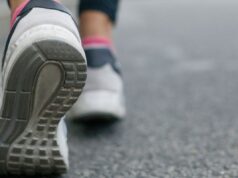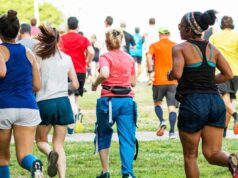By Toni Wade @flamingcopper
The weather is getting warmer and I, like many others, sometimes find it difficult running when it is very warm and sunny. Having ginger hair (thanks Mum!), my skin does not respond well to sunlight and I often find I have forgotten areas when applying sun cream, which results in some lovely sun burn. I try to run early morning when the weather is cooler but sometimes the only time available to run is around lunchtime or mid-morning if participating in a race.
Here are my collection of tips for running in the warm weather:
- Run slower than you usually would until you have been out a few times and are used to the heat – it can take up to 2 weeks for your body to adapt to the heat. If you have to run at the warmest point of the day, try to keep runs to around 30 minutes until your body adapts.
- Wear a hat – keep it loose and made from mesh or other breathable material, try white or another light colour to reflect sunlight instead of absorbing.
- Run early morning or late afternoon if you can – these tend to be the coolest points of the day.
- Sun cream on all exposed areas- don’t forget the ears and back of neck!
Wear Sunscreen: Click to watch
- Even if it’s cloudy you should wear sun cream as you can still get burnt on a cloudy day. Plus sun cream reduces aging signs!
- Try to focus on the distance rather than speed work if having to run at the warmest point of the day.
- Buy a cooling base layer.
- Wear loose fitting clothing.
- Wear technical tshirts – these allow moisture to pass through them to be evaporated, keeping you cooler.
- Wear sunglasses to protect eyes – you can purchase specialist ones for running.
- Change your running route – try to find one which has plenty of trees, these help to provide shade.
- Try to replenish electrolytes afterwards – try a sports drink or the dissolvable electrolyte tablets.
- Always carry water. Stay hydrated but be aware that over-hydration is very dangerous.
The Telegraph, 26 Mar 2012, George Winter
Timothy Noakes, professor of exercise and sports science at the University of Cape Town, South Africa, who has spent the last 30 years researching the topic, says that the dangers of dehydration during endurance exercise have been exaggerated, with the result that cases of EAH (exercise-associated hyponatraemia. Sometimes called water intoxication) are on the rise. He says runners need to be warned that overconsumption of fluids (whether water or sports drinks) before, during, or after exercise can have a potentially fatal outcome.
“There is not a single report in the medical literature of dehydration being a proven, direct cause of death in a marathon runner,” adds Prof Noakes. “But EAH, caused by drinking excessively, has resulted in at least 12 deaths among sportsmen and women.” As well as Rogers in 2007, fatalities include a female US marathoner in 1993 and an American footballer, Paul Allen, in 2010. “In addition,” says Noakes, since 1981, “there have been over 1,600 documented cases of EAH worldwide.”





